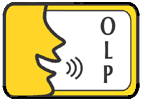Project Summary
Objectives
The overall objective of OLP is to develop and test an integrated computer-based system to supplement conventional speech therapy. More detailed objectives are, in roughly chronological order:
- to recruit client groups and collect databases for the study
- to provide visual feedback mapping instantaneous acoustics onto position on a trainable, two dimensional 'phonetic map'
- to offer a range of trainable automatic speech recognition tools providing evaluative feedback to the client and an interface to speech technology
- to allow Objectives #2 and #3 to be tailored to the needs of a client group or an individual
- to provide an interface allowing this customisation to be performed easily by the therapist
- to make this software available for use off-site as telemedicine; and
- to evaluate OLP with respect to clients and therapists.
Description of the work
Three system components will be developed:
- OPTACIA will visualise vocal tract configurations and dynamics on an arbitrary 2-D map.
- GRIFOS will be an automatic speech recognition system, taking data from OPTACIA sessions and/or existing databases for evaluation and for interfacing to assistive technology.
- TELEMACHOS will be a web-based application supporting remote tutoring and monitoring.
Project work includes 4 core R&D workpackages (and 3 for supporting activities):
- Work on "content design" will focus on definition of clinical scope and of corresponding speech and therapy databases by age, language, and disorder; design of training levels, speech drills, and therapy directions; and definition of functional interface.
- Work on "speech technology" will involve tuning of existing speech visualisation software; integration of a set of available speech recognition tools; and implementation of a friendly user application incorporating all components.
- Work on "Internet-based application development" will apply distance learning and telemedicine technology for remote therapy application.
- And in "system test," application of the final system will be tested in realistic speech therapy settings and will be evaluated by speech therapists through controlled clinical trial.
Efficient management, continuous project monitoring for quality assurance, and diverse dissemination activities will complement development work to ensure project
success.
Expected results
For a person with a speech disorder, OLP will help create correct speech patterns, will provide individualised motivating feedback and an interface to assistive technology, and will allow continuation of therapy outside a clinical setting.
For the speech therapist, OLP will be a valuable tool supplementing speech therapy by facilitating teaching of speech patterns, providing objective client evaluations, and by allowing remote supervision of therapy thus leaving time for more patients.
|
